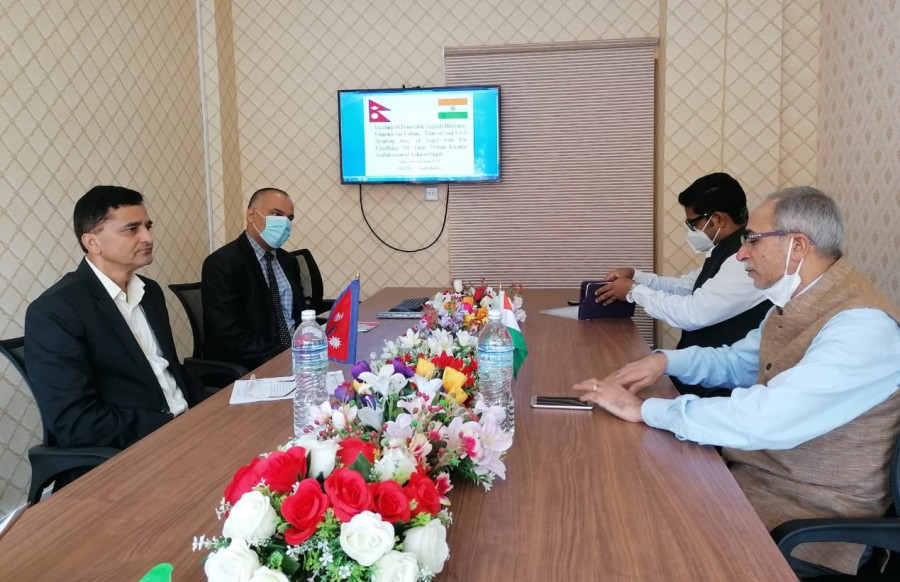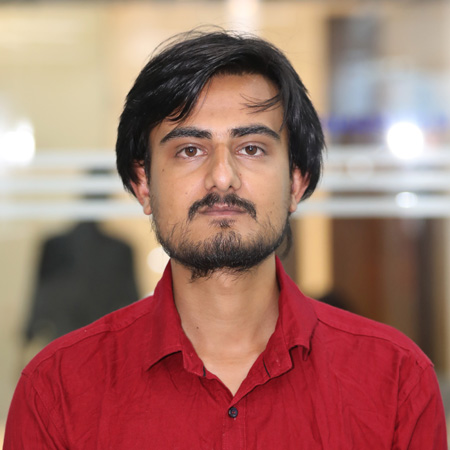National
Tourism minister, who called Nepal coronavirus-free country, tests positive for Covid-19
Yogesh Bhattarai is first minister in the Oli Cabinet to contract the virus after half a dozen close aides to the prime minister tested positive in recent weeks.
Tika R Pradhan & Pawan Pandey
Yogesh Bhattarai, who once declared Nepal a coronavirus-free country to attract tourists, has become the first minister in the Oli Cabinet to contract Covid-19. Bhattarai, who was appointed the tourism minister in July last year, announced on Facebook that he tested positive for the coronavirus on Saturday.
“Last Monday when I tested for Covid-19, my result was negative. After that I participated in some programmes outside Kathmandu. But on Saturday, I tested positive for the coronavirus,” Bhattarai wrote on Facebook.
According to Bhattarai’s post, he had two tests within six days. On Thursday, Bhattarai had attended the Cabinet meeting at Baluwatar, raising concerns if he exposed other ministers to the virus.
A minister, who spoke on condition of anonymity, told the Post that the seating arrangement for the Cabinet meeting “is safe” and that everyone sits at a safe distance.
“The prime minister always sits at least five metres from the ministers who, too, sit maintaining distance from each other,” the minister told the Post. “Masks are mandatory.”
Bhattarai had described Nepal as a coronavirus-free country in February, a month after Nepal reported its first Covid-19 case.
A day after 175 Nepalis were evacuated from Wuhan of China, from where the virus started, Bhattarai said that Nepal is free from coronavirus and called on related government agencies to accelerate efforts to promote Nepal as a safe tourist destination.
Bhattarai is the eighth person from Oli’s orbit to test positive for the virus. After his personal physician Dibya Singh Shah and personal photographer Rajan Kafle tested positive for Covid-19 about two weeks ago, his close aides–Surya Thapa, Rajan Bhattarai, Indra Bhandari and Bishnu Rimal–announced on Twitter last Saturday that they tested positive for the virus. A day later, Oli’s media expert Ram Sharan Bajgain too tested positive for the virus.
Thapa, Bhattarai and Rimal announced on Thursday, again via Twitter, that they had tested negative, raising questions as to how they underwent a second test within five days and why they did not follow the mandatory protocol of 14-day isolation.
Even after Oli’s close aides declared they had tested positive, there was no word from Baluwatar on the prime minister’s health status. Concerns had grown given Oli’s age–he is 69–and his underlying conditions–he underwent a second kidney transplant in March this year and he is said to be immuno-compromised.
Thapa, Oli’s press adviser, told the Post that the prime minister has been taking all the precautions and that he is strictly following health protocols. Apart from the Cabinet meeting, Oli recently attended the party’s Secretariat meeting and has been regularly meeting Pushpa Kamal Dahal, the other chair of the party.
One of Oli’s advisers admitted some negligence and lapses.
“We were taking serious precautions, but after so many people were found infected, we must agree that there have been lapses,” Bhattarai, Oli’s foreign affairs adviser, had told the Post on Friday evening. “We need to find out how that happened.”
Over the past few weeks, as many as 144 persons, including Oli’s advisers and some Nepal Army and Nepal Police personnel deployed at Baluwatar, have tested positive for Covid-19.
Doctors say people in power themselves are not following the government-announced health protocol.
In Thapa, Rimal and Bhattarai’s cases too, they breached the government provision that people should stay in isolation for 14 days and there is no need for retesting. The protocol says a second test is not required for asymptomatic or mild cases who have completed 14 days (at least 3 days without symptoms) after testing positive.
“Nobody should get the facility to retest regardless of who they are–people in power or members of the general public,” said Dr Jageswor Gautam, spokesperson for the Health Ministry. “Some people are doing retests using their power and positions, but they themselves should be responsible for their actions.”
According to Gautam, an infected person need not test again after 14 days in isolation.
Public health experts and government officials have been saying that people must declare when they contract the virus or if they come in close contact with someone who tests positive for the virus.
According to Baluwatar insiders, Bhattarai’s driver had first tested positive around a month ago. After learning that, Bhattarai had stayed in home isolation for six days. He had resumed work after he tested negative.
No further details are available.
Doctors say no official statement from Baluwatar on the prime minister’s health despite so many people testing positive for the virus is cause for concern.
Dr Baburam Marasini, former executive director of the Epidemiology and Disease Control Division, said no public statement from Baluwatar despite so many people getting infected with the virus raises both confusion and concerns.
“A lot of people work for the prime minister. When some of them test positive, there is a need to tell people about the prime minister,” said Marasini. “It looks like powerful people think health protocols are applicable only to the general public and the poor and not for them.”
Over the last six days, during which Minister Bhattarai says he underwent two tests, he has visited various places and met with people–inside and outside the Capital. Most of the time he is seen without masks.
On Friday, Bhattarai held a meeting with Indian ambassador to Nepal Vinay Mohan Kwatra at Singha Durbar without wearing a mask.
“I had a fruitful meeting with Indian Ambassador Shri Vinay Mohan Kwatra today regarding various bilateral issues related to this ministry including air routes between Nepal and India over Bhairahawa, Nepalgunj and Mahendranagar entry/exit points,” tweeted Bhattarai with some photos in which he was not wearing a mask.
On October 7, he inaugurated a border outpost in Olangchung Gola in Taplejung. He was not wearing a mask in a photo taken with some officials and security personnel.
On October 5, Bhattarai was in Biratnagar to attend a programme where Province 1 Chief Minister Sherdhan Rai and other officials were present. He was not wearing a mask then too.
As the number of coronavirus cases continues to rise in the country, public health experts say taking precautions—wearing masks, using sanitisers, maintaining physical distance and avoiding crowds—is the best way to avoid contracting the virus since the government authorities are doing almost nothing to control the spread.
On Friday, Nepal’s national Covid-19 tally crossed the 100,000 mark. The country reported its highest daily spike on Saturday with 5,008 new infections. The country’s death toll stands at 614, with 14 Covid-19-realted fatalities reported in the last 24 hours.
Health Ministry spokesperson Gautam on Saturday admitted that the country is in a difficult situation, as Covid-19 cases have been rising.
“A very difficult time has come for us. Hospitals and isolation centres are almost full with infected people, infection rate is increasing and recovery rate is decreasing,” said Gautam during the daily press briefing. “With this, we can assume that we are heading towards a more difficult situation.”
Another minister from the Oli Cabinet, who also spoke on condition of anonymity, said he was now concerned about himself as he attended Thursday’s Cabinet meeting and he has pre-existing health issues.
“My concerns have grown after knowing that a fellow minister has tested positive for the coronavirus,” said the minister. “I have my health issues and I am a diabetic too.”




 9.83°C Kathmandu
9.83°C Kathmandu















